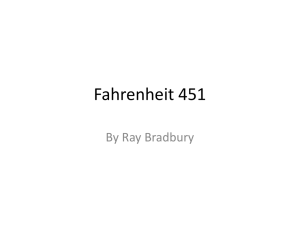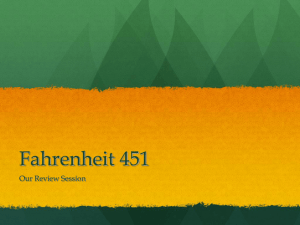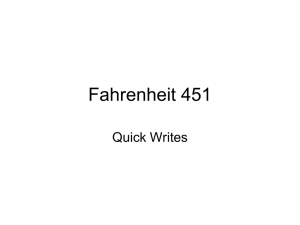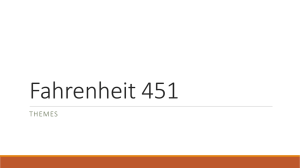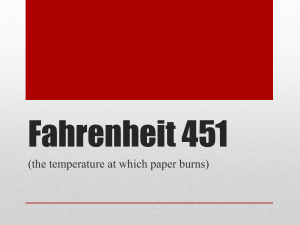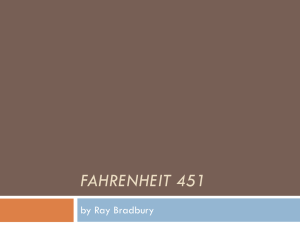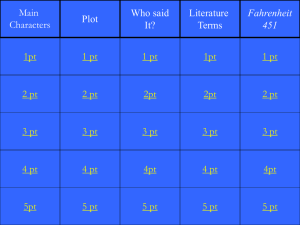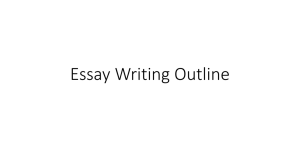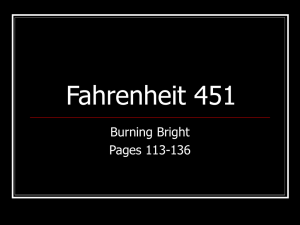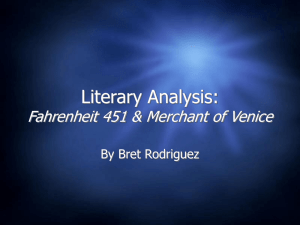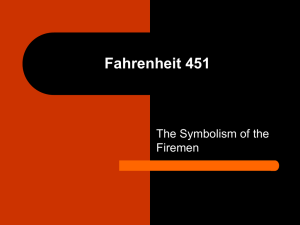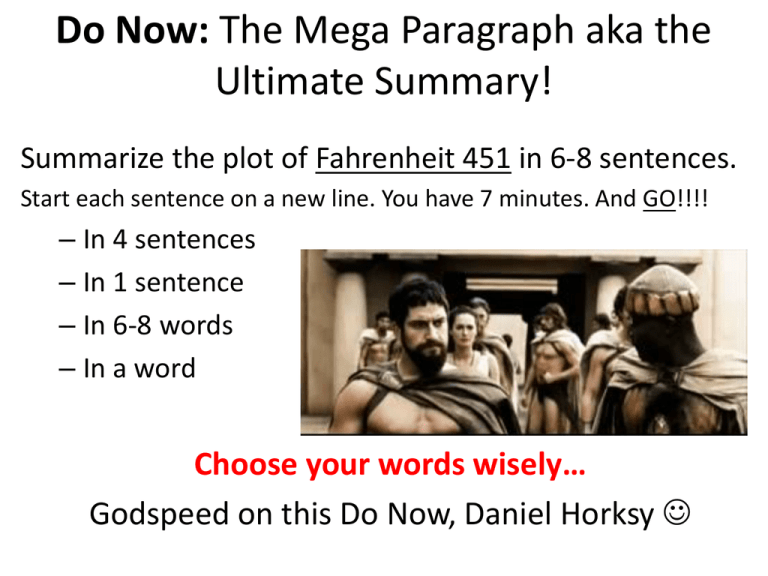
Do Now: The Mega Paragraph aka the
Ultimate Summary!
Summarize the plot of Fahrenheit 451 in 6-8 sentences.
Start each sentence on a new line. You have 7 minutes. And GO!!!!
– In 4 sentences
– In 1 sentence
– In 6-8 words
– In a word
Choose your words wisely…
Godspeed on this Do Now, Daniel Horksy
Scene 1: Boy Meets Girl
This is the scene where Montag first sees Clarisse. He describes her
to be in a white dress, possess skin of porcelain, and cast a strange
otherworldy spell on him. She has eyes that are like mirrors. And
when he met her, his life changed forever.
Scene 2: The Overdose
When Montag gets home after meeting Clarisse, he finds that his
wife, Mildred, overdosed on sleeping pills.
Scene 3: Joan of Arc
A woman has possessed a large amount of books, and the firemen are prepared to
burn her and the books down. However, instead of getting out of the house, the
woman chooses to die by letting herself burn with the books. Montag, curious,
then steals one of the lady's books just before she lights her house on fire.
Scene 4: Clarisse's Death
From Mildred, Montag learns of Clarisse's death. It was believed
that she was hit by a car while she was walking as a pedestrian.
Scene 5: The Lecture
Shortly after Montag is about to call in sick for work, Beatty comes
over to Montag's house to lecture him about the history of firemen
and the history of books.
Scene 6: The Books
This picture represents the plethora of books that fall from the
ventilator grill. After Beatty leaves, Montag reveals to Mildred the
large book collection that he's accumulated in the ventilator over
the past few years.
Scene 7: The Three Useless
Nonsensical Ladies Watching TV
Mildred invites a few friends over to watch TV with her. The TVs in
Fahrenheit 451 are huge and take up whole walls. While they are over,
they frustrate Montag with their useless talk, and their useless TV shows.
Scene 8: Poems & Tears
After Montag is at his wit's end with Mildred's friends, he decides to read a poem
to them, nearly blowing Faber and Montag's cover. After finishing one poem, Mrs.
Phelps (Mildred's friend) ends up crying for an unknown reason.
Scene 9: Montag Burns His House
After Mildred calls in a fire alarm for her own house, Montag is forced (by Beatty)
to burn his own house down because of the books that were in there. In a way,
Montag finds it strangely cleansing because he feels that burning his old life would
let him start a new one.
Scene 10: Beatty's Death
After Montag burns his house down, Beatty finds out about Montag's plan to
restore society and bring back books and thorough thinkers. After being
threatened, Montag burns Beatty.
Scene 11: Montag's Leap of Faith
After burning Beatty and killing a Mechanical Hound, Montag flees the scene and
runs away to Faber's house. There, he makes a plan to run away and out of the city
before he is caught.
Scene 12: The River
When Montag reaches the river and dives in, he suddenly feels calm and lets all his
old memories and sad thoughts drift away downstream. While he is here, he looks
at the sky and realizes that all he wants is to change the world and change his life.
Scene 13: The Countryside
When Montag gets out of the river and passed the railroad tracks, he
finally finds himself out in the open on the countryside. Here he finds a
group of well-educated men who are authors, reverends, and real
thinkers. Together, they make a plan to change society. When society is
finally burned and gone, they play to restore it and rebuild everything.
Scene 14: The City Replenishes
Montag takes one last look at the burning city. One last look at the city that's
being destroyed and bombed in the war. He then moves on, and plans to make a
new beginning rise out of the ashes.
Fahrenheit 451
Identifying Themes,
Literary Devices,
& Archetypes
Themes
Technology
Censorship
Ignorance vs. Knowledge
Conformity vs. Individuality
Action vs. Inaction
Distraction vs. Happiness
Without thinking about Fahrenheit 451, how do each of these themes relate
or build off of each other?
Ray Bradbury once said…
"After all, a computer is a book and a longplaying record is a book—they just have
different shapes."
Respond to the following quote on the same page as your summaries.
What do you think Bradbury meant by this? Do you agree or disagree?
Role of Technology in F°
•
•
•
•
Parlor Walls
Mechanical Hound
Sleeping pills
????????
How does technology contribute to the deficits and problems with society in
the story? Are people dumber, more ignorant, or less human/social? How
does technology influence us today?
?
Technology Today?
What’s Your Censorship IQ?
1. Censorship is when...
A Government limits free speech
B Parents tells their kids what not to read,
watch or listen to
C Private citizens try to ban books, movies,
videos or recordings
D All of the above
2. What U.S. government document forbids
censorship?
A U.S. Constitution
B Bill of Rights
C First Amendment
D All of the above
3. What does the First Amendment protect?
A Freedom of speech/freedom of the press
B Freedom of religion
C The right to assemble
D The right to petition the government with
grievances
E All of the above
4. Do kids have First Amendment rights?
A Yes, they have the same right to free speech
as adults.
B Yes, they have rights but not the same as
adults.
C No.
5. Who was the most banned author in the
United States in 1999 and 2000?
A Judy Blume
B Robert Cormier
C J.K. Rowling
D Roald Dahl
6. How many books were challenged in the
United States in 2000?
A 165
B 472
C 646
D 859
7. Where do most challenges in the United
States occur?
A Public libraries
B Public schools
C Art museums
D Bookstores
8. Which one of the following titles has NOT been
challenged?
A Mark Twain, Adventures of Huckleberry Finn
B Maurice Sendak, In the Night Kitchen
C Roald Dahl, James and the Giant Peach
D C.S. Lewis, The Lion, the Witch and the Wardrobe
E Dr. Seuss, Cat in the Hat
9. What reason is given most often for censoring
books used in the public schools?
A Cursing, bad language
B Sexual content
C Witchcraft
D Ethnic/racial prejudice
E Violence
10. What other media are people trying to censor
in addition to books?
A Internet
B Video games
C Music
D Movies, videos
E All of the above
11. Where was the biggest fight in 2000 over the
Harry Potter books?
A Zeeland, Michigan
B Oxnard, California
C Tupelo, Mississippi
D Freeport, Maine
E Truth or Consequences, New Mexico
12. Which of the following complaints has NOT
been made about the Harry Potter books?
A They teach witchcraft.
B They are violent.
C They teach disrespect for authority.
D They have too much sex.
Answers:
1.
2.
3.
4.
5.
6.
A
D
E
B
C
C
7. B
8. E
9. B
10.E
11.A
12.d
Dependency on Technology and Its
Effects on Us
Censorship in F° 451?
• Is there a connection between censorship and
technology in Fahrenheit 451? Censorship and
technology in our society?
• How was information controlled in Fahrenheit
451?
• Think about the history lesson Beatty gives to
Montag about the history of the fire
department. Was history rewritten? Why do
you think so? Draw parallels to 1984.
Should books be banned or censored?
FREADOM
• Freedom of speech is our
most basic and
important right. Why?
• How does controlling
what we are able to read
and learn dictate power?
How many have you read?
Closing books… shuts out ideas
Ignorance vs. Knowledge in F° 451?
• How does Mildred represent the ignorance is
bliss mentality?
• Montag has two life changing experiences in
The Hearth and the Salamander. Identify and
then explain both of them.
• Does knowledge set you free?
Conformity vs. Individuality in F° 451?
• Explain self-absorption in the context of
Fahrenheit 451.
• How does the government control individuals
to promote conformity? (Relate back to
censorship!!!!)
– Psychiatrist visits
– Beatty on political correctness
• McCarthyism
• “Bland and blend”
Action vs. Inaction in F° 451?
• How does ignorance and
enlightenment AND
conformity and individualism
lead to either action or
inaction in Fahrenheit 451.
• What causes people to be
indifferent? In what ways are
you indifferent or passive
when you can or should take
action? What stops you from
acting?
Are you an inaction figure?
Distraction vs. Happiness in F° 451?
• How do all of these
themes connect to
happiness?
• Happiness and
contentment. Is there a
difference? What about
settling?
Literary Devices in F° 451
• Simile - a figure of speech that directly compares two different things,
usually by employing the words "like", "as".
• Metaphor - a literary figure of speech that uses an image, story or tangible
thing to represent a less tangible thing or some intangible quality or idea
• Irony - a rhetorical device, literary technique, or situation in which there is
a sharp incongruity or discordance that goes beyond the simple and
evident intention of words or actions.
• Imagery - occurs when an author uses an object that is not really there, in
order to create a comparison between one that is, usually evoking a more
meaningful visual experience for the reader.
• Media Res - when a story begins either at the mid-point or at the
conclusion, rather than at the beginning
• Paradox - a statement that is apparently self-contradictory or absurd but
really contains a possible truth. Sometimes the term is applied to a selfcontradictory false proposition. It is also used to describe an opinion or
statement which is contrary to generally accepted ideas. Often, a paradox
is used to make a reader consider the point in a new way.
We’ll revisit literary devices on Friday. Make sure to bring your book!
Archetypes in F° 451
Situational Archetypes:
• The Quest
• The Fall
• Death and Rebirth
• Nature vs. the
Mechanistic World
Symbolic Archetypes:
• Light vs. Darkness
• Wise Old Man
• Devil Figure
• Female Muse
• Innate Wisdom vs.
Educated Stupidity
Archetype Assignment
• Pick TWO (2) situational archetypes and TWO
(2) symbolic archetypes to examine
– Explain and define each archetype
• For each archetype, find TWO (2) key passages
and provide analysis for each passage.
– Make sure to include the direct quotation and
page number
• DUE end of class.
Example:
Situational Archetype #1
Passage 1 “give a direct quotation from the novel” (Bradbury 18).
Passage 2 “give a direct quotation from the novel” (Bradbury 47).
•My analysis of how Passage 1 is an example of the quest
•My analysis of how Passage 2 is an example of the quest


